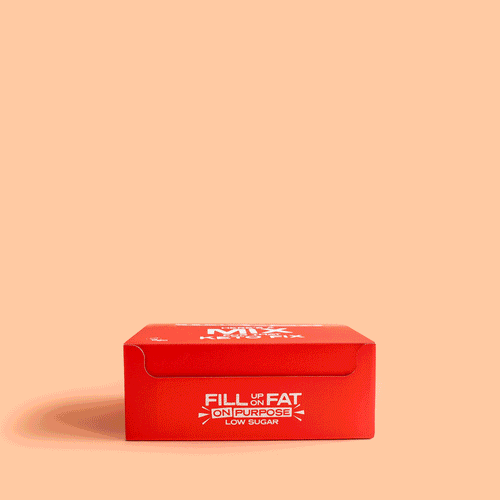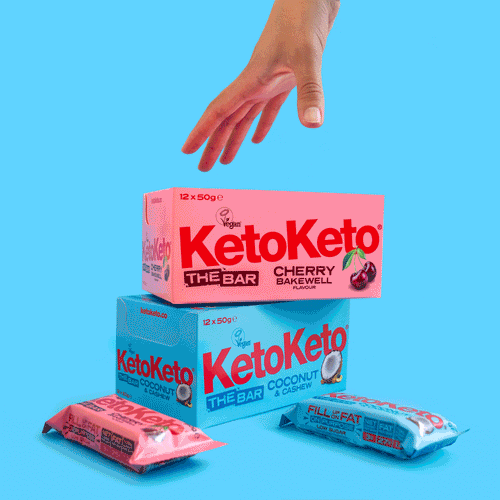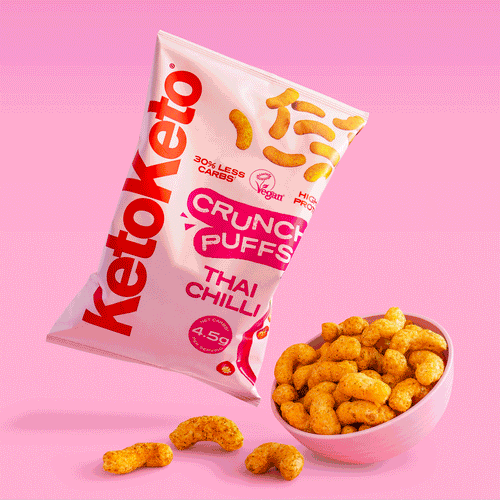Anxiety disorders are the most common mental health disorders worldwide [1]. It is estimated that by 2030, the prevalence of mental health disorders will continue to grow and account for the majority of all diseases globally.[2] With alarming statistics like that, it is no wonder that people are looking for ways to take control of their mental health.
Diet is one area that most people can modify that might have a major impact on mental health. Keto and low carb diets are a popular choice for weight loss, but can they also be beneficial for anxiety? First let’s review the basics of both anxiety and the keto diet.
What is Anxiety?
Anxiety is a mental health disorder characterized by persistent feelings of tension, intrusive thoughts, and/or physical changes like increased heart rate and sweating. Unlike fear, which is an appropriate response to a specific threat, anxiety is wide-spread and longer lasting.[3]
Other symptoms can include:
- trouble concentrating or making decisions
- feeling irritable, tense or restless
- experiencing nausea or other gi issues
- trembling or shaking
- trouble falling or staying asleep
- having a sense of impending doom
Causes of anxiety can be hard to pinpoint and may include genetic factors, stress, trauma, chemical imbalances, physical illnesses and lifestyle habits.
Having anxiety puts a person at risk for developing further complications, such as depression, substance use disorders, and suicidal thoughts and behaviors.
Fortunately, there are several effective treatments for anxiety disorders that healthcare professionals can use, and anyone with symptoms should seek help. Lifestyle changes, to include dietary modifications, can play a huge role in the support of treatment for anxiety disorders.
What are Low Carb & Keto Diets?
While there is no formal definition of “low-carb,” it generally involves getting fewer than 26% of your total calories from carbohydrate sources. This means that if you eat 2000 calories per day, no more than about 520 calories will be from carbs. This translates to a maximum of 130g of total carbohydrates for the day.
A ketogenic diet is a more specific low-carb diet in that it is high in fat, moderate in protein, and very low in carbs. No more than 5-10% of total calories come from carbohydrate sources for most people on a keto diet. For our same 2000 calorie per day example, that's only 100-200 calories, or 25-50g of carbs total per day.
How a Keto Diet Works
The keto diet works by forcing the body to switch its primary energy source from glucose (from carbohydrates) to ketone bodies (from fat). Glucose is the preferred fuel, so eating a very low amount of carbs causes the body to start looking elsewhere for energy.
Ketone bodies are next in line for fuel. When the body switches to using ketone bodies for energy, it is known as being in a state of ketosis. Being in ketosis has proven health benefits that we will get to below.
Keto has already been proven to be beneficial for more than just weight loss. Studies have shown improvement in diseases like Parkinson’s, cardiovascular disease, Alzheimer’s, and diabetes, but what about anxiety? [5]
Potential for Keto to Improve Anxiety
Several uncontrolled studies have shown that the keto diet may be effective in improving anxiety. It is important to note, however, that high quality scientific evidence is lacking at this time. [6] Here are just some of the ways in which it is thought that the keto diet can improve anxiety:
- Stabilize Blood Sugars: Obviously if we eat less sugar, there is less sugar going into the blood! More stable blood sugars can lead to improved energy and mood.
- Improve Insulin Resistance: Insulin is the hormone responsible for blood sugar regulation, and a high carb diet can lead to insulin resistance. Insulin resistance has been shown to correlate with anxiety disorders, so improving insulin and subsequently blood sugar levels, may be beneficial for anxiety. .[7]
- Balance the Gut Microbiome: If you have ever experienced stomach problems with your anxiety, you might already be aware that the gut and brain are directly connected. Did you know that 95% of the body’s serotonin is actually produced in the gut? If things aren’t working well there, it can directly affect us mentally, even if we aren’t manifesting any gut symptoms. A high sugar diet can throw off the balance of “good” and “bad” gut bacteria, and lead to what is known as leaky gut. A low carb keto diet can help bring back those good microbes and positively affect the whole gut-brain axis. [8]

- Increase GABA Levels: It appears that a keto diet allows for better synthesis of GABA, an important neurotransmitter that produces a calming effect. Many anti-anxiety medications work to mimic the effects of GABA, so naturally increasing its production may have beneficial effects on anxiety.
- Improved Mitochondrial Function: The “powerhouse of the cell,” mitochondria are essential to energy production, and overall mitochondrial function has been shown to improve on a keto diet. Emerging research is also showing a link between alterations in mitochondrial function and chronic diseases, to include anxiety.[9]
- Weight Loss: Concern about body image and health can be a cause for anxiety in some individuals. A keto diet has been shown to reduce body weight, so it may also help alleviate some of that anxiety surrounding that.
What’s Wrong with High-Carb Diets?
While carbohydrates are not inherently bad, a diet high in simple carbs and low in fiber can lead to all of the following conditions. Each one of these may also play a role in mental health disorders like anxiety.
- Nutrient deficiencies: Heavily processed and fast foods are notoriously high in calories and carbohydrates, and low in key nutrients vital for maintaining consistent energy and positive moods.
- Inflammation: Simple and refined carbohydrates like those found in white bread, cookies and chips are known to be pro-inflammatory. Systemic inflammation has been shown to directly affect areas of the brain that can impact mood disorders, including anxiety. [10]
- Blood sugar fluctuations: High carb meals can cause blood sugar to spike, followed by the dreaded crash shortly after. Those ups and downs make it difficult to regulate moods and energy levels.
- Gut dysbiosis: High sugar diets disrupt the intestinal barrier and lead to leaky gut, which is the precursor for dozens of metabolic diseases that can directly relate to anxiety.
- Food sensitivities from preservatives & additives: High carb diets rarely make you feel great, but they can be especially problematic if you have a sensitivity to commonly used food additives, colorings, and preservatives. Symptoms of food sensitivities can include skin problems, brain fog, bloating and other GI problems.

The KetoKeto Box Combo
Our bars are made to help curb cravings and keep you fuller for longer. With only 3g of net carbs per bar, they’re the perfect Keto snack for anytime during the day.
Save more when you buy more, by taking advantage of our Box Combo deal. Pick your favourite flavours or try a new flavour for a change.
Keto Superfoods for Anxiety
While a keto diet may have health benefits, it has to be implemented the right way to reap those rewards. This should include plenty of fiber, whole foods, healthy fats and lean protein. Here are just some of the important keto-friendly foods to include in your diet to see the biggest benefit.
- Avocados for their heart-healthy fats
- Raspberries for their low-carb, high fiber, antioxidant rich content
- Olive oil for its high polyphenol antioxidants to help reduce inflammation
- Cruciferous vegetables for gut-healthy fiber, plus compounds that support detoxification
- Bone broth for glutamine which can repair leaky gut, as well as glycine which reduces anxiety and aids in relaxation

Getting the Most out of a Low-Carb & Keto Diet
While more research is needed, there is a clear potential for low carb and keto diets to play a role in improving mental health disorders like anxiety. Many of the anxiety-fighting benefits of a keto diet hinge on it containing enough fiber and nutrients, which can sometimes be lacking with the elimination of carbohydrates. A keto diet that prioritizes healthy fat sources, high quality protein, and includes lots of fiber rich low carb fruits and veggies is key.
It’s important to talk to your doctor before beginning any new diet program to see if a keto or low-carb diet is right for you. With careful planning, a low carb or keto diet may be a powerful tool in the treatment and management of anxiety.
References
1. World Health Organization (WHO). Anxiety Disorders.
2. Mental Health Foundation. The Cost of Diagnosed Mental Health Conditions: Statistics
3. American Psychological Association. Anxiety.
4. Masood,W. Et al. NIH. Ketogenic Diet.
5. Crosby, L. et al. National Library of Medicine. Ketogenic Diets and Chronic DIsease: Weighing the benefits against the risks
6. Dietch, D. et al. Efficacy of low carbohydrate and ketogenic diets in treating mood disorders and anxiety: systematic review and implications for clinical practice.
7.Mikstas, C. Keto Diet: How it Relates to Depression
8. Kumar, A. Gut Microbiota in Anxiety and Depression: Unveiling the Relationships and Management Options.
9. Daniels, T. et al. Stress and Psychiatric Disorders: The Role of Mitochondria.
10. Imaging the Role of Inflammation in Mood and Anxiety Related Disorders.






